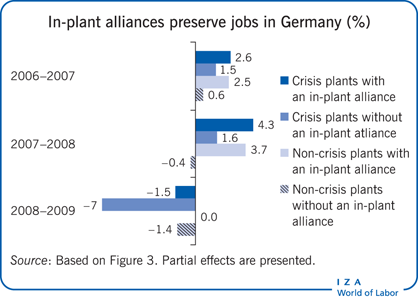Elevator pitch
In-plant alliances that tailor specific deviations from sectoral collective agreements on wages and working time are intended to hold down labor costs. These agreements enable reorganizations to respond to an imminent economic crisis or to improve competitiveness. They encourage social partners to take greater responsibility for employment issues. Both unions and works councils agree to such contracts because they see them as inevitable to avoid severe employment losses. Thus, these alliances substantially unburden public employment policy.

Key findings
Pros
In-plant alliances can help firms survive, save jobs, and foster employment.
In-plant alliances reduce labor costs and thus indirectly foster a higher number of employees.
More flexible working-time regulations and reorganizations as part of in-plant alliances increase both labor productivity and firm competitiveness, contributing to an increase in employment as well.
In-plant alliances encourage social partners to take greater responsibility for employment issues.
Cons
Some pledges by employers for employment may be difficult to fulfill, especially if the firm’s economic situation deteriorates.
In-plant alliances tend to distort labor markets because they favor insiders over outsiders by restricting layoffs.
Employment expectations could be exaggerated if in-plant alliances are seen as bucking market trends.
In-plant alliances could erode sectoral collective agreements.
In-plant alliances cannot deviate “too much” from the collective agreement, because unions would not agree to that.